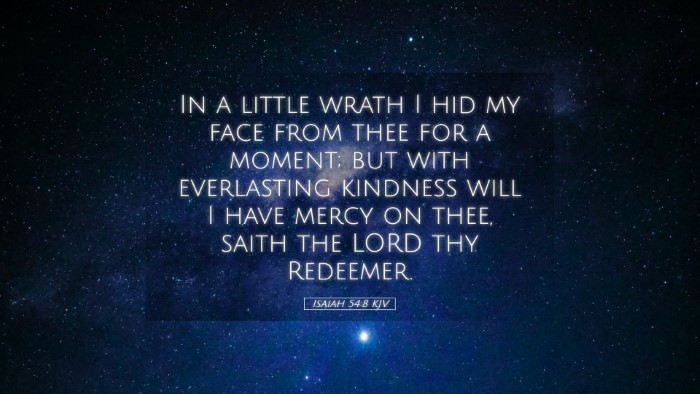Commentary on Isaiah 54:8
Isaiah 54:8 states:
"In a surge of anger I hid my face from you for a moment, but with everlasting kindness I will have compassion on you,” says the Lord your Redeemer.
This verse encapsulates a profound transition from divine wrath to mercy, illustrating the complexities of God's relationship with His people. Below is a summary of insights from esteemed public domain commentators.
Contextual Background
The backdrop of Isaiah 54 is the restoration of Israel after a period of judgment. The prophet Isaiah conveys messages of comfort and hope to a nation that has experienced turmoil, reflecting God's desire for reconciliation. This chapter emphasizes themes of redemption, love, and the assurance of God's enduring covenant.
Divine Anger and Compassion
According to Matthew Henry, the phrase "surge of anger" indicates a temporary but intense displeasure from God due to the unfaithfulness of His people. It underscores the seriousness of sin but simultaneously points to God's nature, which is ultimately rooted in love and compassion.
Albert Barnes expands on this by suggesting that the "hiding of the face" symbolizes God's withdrawal of favor. Yet, Barnes emphasizes that this withdrawal is not permanent; it serves a purpose and is followed by a restoration marked by "everlasting kindness."
Adam Clarke points out that this verse illustrates a transformation from judgment to grace, reminding the readers that though God may discipline, His ultimate intention is to forgive and restore. Clarke asserts that God's compassion is not only a momentary act but a lasting commitment to His people.
Theological Implications
-
The Nature of God: The duality of God's anger and compassion reveals His holiness juxtaposed with His love. This complexity is essential for understanding the character of God as both righteous and merciful.
-
Covenant Relationship: The invocation of "everlasting kindness" signifies the permanent nature of God's promises to His people. This reflects the larger biblical narrative of God's unwavering commitment to His covenant with Israel and, by extension, with believers today.
-
Hope in Restoration: The promise of compassion provides a foundation for hope. Even when God's people face the consequences of their actions, there is an assurance that reconciliation is always possible. This hope is vital for both personal and corporate worship.
Exegesis of Key Terms
Each key term in Isaiah 54:8 contributes to the overarching message:
-
Surge of Anger: This phrase conveys a momentary outburst of divine wrath that correlates to God's righteous judgment against sin.
-
Hid My Face: A metaphor for God's absence; this indicates a sense of estrangement that often accompanies sin.
-
Everlasting Kindness: This term denotes a steadfastness in God's love that is perpetual and unchanging, contrasting sharply with human commitments.
-
Compassion: Defined as deep empathy, God’s compassion here suggests a desire not just to forgive but to nurture and restore His people.
Applications for Modern Believers
Isaiah 54:8 offers rich theological and practical applications:
-
Understanding Sin: Believers are reminded of the seriousness of sin and its consequences. Acknowledging God's anger helps foster a deeper sense of repentance.
-
Embracing Forgiveness: The promise of compassion invites believers to experience God's forgiveness personally, encouraging ongoing spiritual growth and maturity.
-
Inspiring Hope: In times of distress, remembering this verse can inspire hope and a renewed trust in God's redemptive plans.
-
Encouraging Others: Pastors and ministry leaders can use this verse to comfort and encourage their congregations, reminding them of God's faithfulness even in the midst of trials.
Conclusion
Isaiah 54:8 serves as a profound reminder of the complexities of God's character—a blend of righteous anger and everlasting kindness. The insights of Matthew Henry, Albert Barnes, and Adam Clarke illuminate the beauty of God's promise of restoration and compassion, giving both theological depth and practical guidance for believers today. Engaging with this verse invites reflection on the nature of divine love while fostering hope for renewal and reconciliation in the lives of individuals and communities alike.


